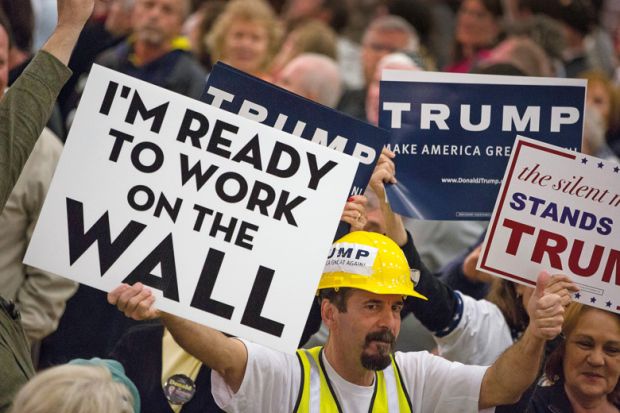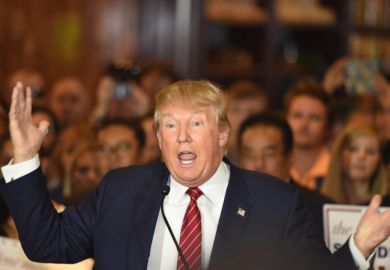The leader of Johns Hopkins University said he is “simply dumbfounded” by the support Donald Trump has generated in the race to be US president and lamented that universities have not been effective at redressing “profound disillusionment” within society.
Commenting before the recent furore broke about Mr Trump's conduct around women, Ronald Daniels, president of the Baltimore institution, told Times Higher Education that the “kind of rhetoric, violence and some of the really base politics that’s been unleashed” by the Trump campaign is “unnerving to say the least”.
When asked how worried he was about America’s political climate, he said: “Very. This is a very serious election.
“I think a lot of us are simply dumbfounded that we’ve seen the support that’s been evidenced for Mr Trump.
“In particular…on the core issue of the role of ideas, of facts, and whether they matter in contemporary political discourse, we are observing something that is deeply unsettling, and at least to my mind in recent American history, unprecedented.”
Professor Daniels, a Canadian-born law and economics scholar in Johns Hopkins’ department of political science, said the political landscape in many parts of Europe, the US and the UK, as evidenced by the Brexit vote, reflects “very concentrated and profound disillusionment in large parts of our society that I don’t think we have fully comprehended and certainly haven’t been effective in being able to redress”.
He referenced societal problems such as stagnation in wages and benefits, loss of life expectancy and high levels of youth unemployment, and said that while public policy academics across the political spectrum have “talked a lot about the disintegration of white middle-class families”, universities have failed to respond with practical solutions.
“The question is: have universities in the United States and indeed internationally been successful in mustering up analysis [and] policy recommendations that are able to infiltrate the political process and bring our practicable ideas to bear that can alleviate some of these issues?” he said.
“Have we been effective as institutions of higher learning in [producing a] comprehensive policy package that could respond to these issues? I think the answer is not to the degree that we must.”
He added that there is a growing recognition by universities of their role as “anchor institutions” and their need to engage with their local communities.
“You have to be a place that protects academic freedom, that allows people to follow subversive ideas wherever that may take them…so you need some independence from society,” he said.
“On the other hand, you have to be deeply connected to that same society and through your strengths, through your autonomy, be able to feed into and shape initiatives that are designed to address some of the more serious problems society confronts.”
Register to continue
Why register?
- Registration is free and only takes a moment
- Once registered, you can read 3 articles a month
- Sign up for our newsletter
Subscribe
Or subscribe for unlimited access to:
- Unlimited access to news, views, insights & reviews
- Digital editions
- Digital access to THE’s university and college rankings analysis
Already registered or a current subscriber? Login








